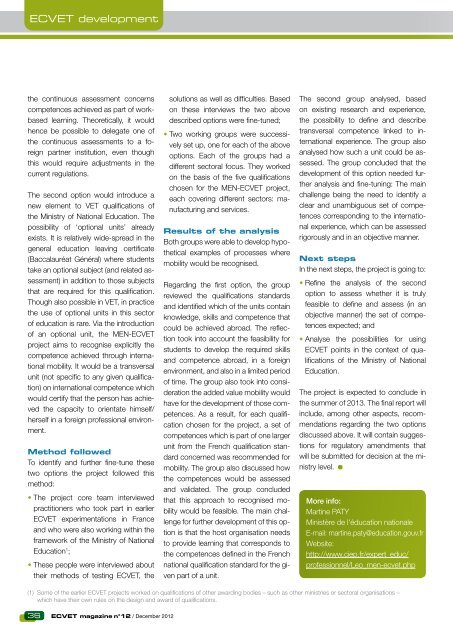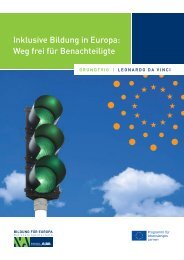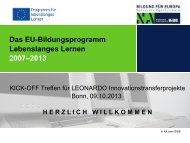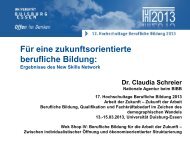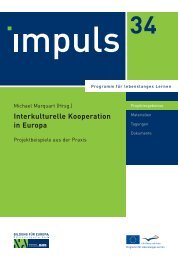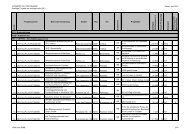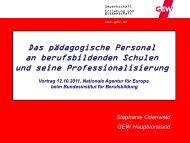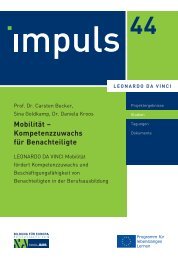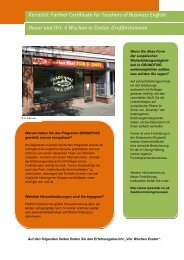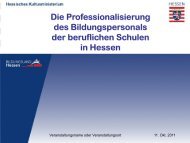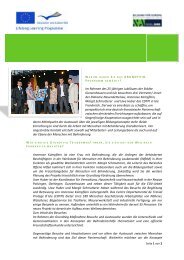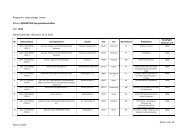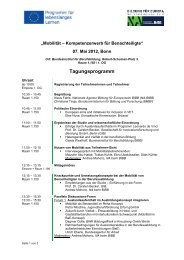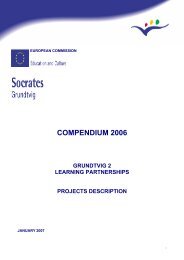You also want an ePaper? Increase the reach of your titles
YUMPU automatically turns print PDFs into web optimized ePapers that Google loves.
ECVET development<br />
the continuous assessment concerns<br />
competences achieved as part of workbased<br />
learning. Theoretically, it would<br />
hence be possible to delegate one of<br />
the continuous assessments to a foreign<br />
partner institution, even though<br />
this would require adjustments in the<br />
current regulations.<br />
The second option would introduce a<br />
new element to VET qualifications of<br />
the Ministry of National Education. The<br />
possibility of ‘optional units’ already<br />
exists. It is relatively wide-spread in the<br />
general education leaving certificate<br />
(Baccalauréat Général) where students<br />
take an optional subject (and related assessment)<br />
in addition to those subjects<br />
that are required for this qualification.<br />
Though also possible in VET, in practice<br />
the use of optional units in this sector<br />
of education is rare. Via the introduction<br />
of an optional unit, the MEN-ECVET<br />
project aims to recognise explicitly the<br />
competence achieved through international<br />
mobility. It would be a transversal<br />
unit (not specific to any given qualification)<br />
on international competence which<br />
would certify that the person has achieved<br />
the capacity to orientate himself/<br />
herself in a foreign professional environment.<br />
Method followed<br />
To identify and further fine-tune these<br />
two options the project followed this<br />
method:<br />
• The project core <strong>team</strong> interviewed<br />
practitioners who took part in earlier<br />
ECVET experimentations in France<br />
and who were also working within the<br />
framework of the Ministry of National<br />
Education1 ;<br />
• These people were interviewed about<br />
their methods of testing ECVET, the<br />
solutions as well as difficulties. Based<br />
on these interviews the two above<br />
described options were fine-tuned;<br />
• Two working groups were successively<br />
set up, one for each of the above<br />
options. Each of the groups had a<br />
different sectoral focus. They worked<br />
on the basis of the five qualifications<br />
chosen for the MEN-ECVET project,<br />
each covering different sectors: manufacturing<br />
and services.<br />
Results of the analysis<br />
Both groups were able to develop hypothetical<br />
examples of processes where<br />
mobility would be recognised.<br />
Regarding the first option, the group<br />
reviewed the qualifications standards<br />
and identified which of the units contain<br />
knowledge, skills and competence that<br />
could be achieved abroad. The reflection<br />
took into account the feasibility for<br />
students to develop the required skills<br />
and competence abroad, in a foreign<br />
environment, and also in a limited period<br />
of time. The group also took into consideration<br />
the added value mobility would<br />
have for the development of those competences.<br />
As a result, for each qualification<br />
chosen for the project, a set of<br />
competences which is part of one larger<br />
unit from the French qualification standard<br />
concerned was recommended for<br />
mobility. The group also discussed how<br />
the competences would be assessed<br />
and validated. The group concluded<br />
that this approach to recognised mobility<br />
would be feasible. The main challenge<br />
for further development of this option<br />
is that the host organisation needs<br />
to provide learning that corresponds to<br />
the competences defined in the French<br />
national qualification standard for the given<br />
part of a unit.<br />
The second group analysed, based<br />
on existing research and experience,<br />
the possibility to define and describe<br />
transversal competence linked to international<br />
experience. The group also<br />
analysed how such a unit could be assessed.<br />
The group concluded that the<br />
development of this option needed further<br />
analysis and fine-tuning: The main<br />
challenge being the need to identify a<br />
clear and unambiguous set of competences<br />
corresponding to the international<br />
experience, which can be assessed<br />
rigorously and in an objective manner.<br />
Next steps<br />
In the next steps, the project is going to:<br />
• Refine the analysis of the second<br />
option to assess whether it is truly<br />
feasible to define and assess (in an<br />
objective manner) the set of competences<br />
expected; and<br />
• Analyse the possibilities for using<br />
ECVET points in the context of qualifications<br />
of the Ministry of National<br />
Education.<br />
The project is expected to conclude in<br />
the summer of 2013. The final report will<br />
include, among other aspects, recommendations<br />
regarding the two options<br />
discussed above. It will contain suggestions<br />
for regulatory amendments that<br />
will be submitted for decision at the ministry<br />
level.<br />
More info:<br />
Martine PATY<br />
Ministère de l'éducation nationale<br />
E-mail: martine.paty@education.gouv.fr<br />
Website:<br />
http://<strong>www</strong>.ciep.fr/expert_educ/<br />
professionnel/Leo_men-<strong>ecvet</strong>.php<br />
(1) Some of the earlier ECVET projects worked on qualifications of other awarding bodies – such as other ministries or sectoral organisations –<br />
which have their own rules on the design and award of qualifications.<br />
36 ECVET magazine n°12 / December 2012


